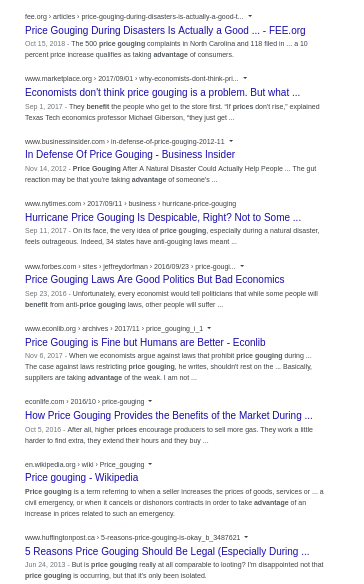Would it not be more ethical to limit the quantity sold per person than to raise the price to a level that only the rich can afford?
Take the gas station example where some event has caused a severe shortage and only one station in a area has any fuel left. Instead of raising the price to $50 a gallon, would it not be a bit more ethical to just limit the sale to 5 gallons per person or some such figure. It accomplishes a similar goal, of keeping people from hoarding and yet still allows the poor to at least set their foot on the playing field of the rich.
Some stores do this, they limit purchases to 2 items per person. Evidently this guy was not limited since he would clean out entire shelves of sanitizer.
Well, price float is a form of rationing. You've kind of loaded your comment by saying
"raise the price to a level that only the rich can afford". I might have thrown around 10x to pick a number out the air, but it probably would not even need to be that high.
Double it (and have a big sign - "Prices DOUBLED until we get more shipments") and I bet a significant number of people would pause and think
-"wait, I have enough at home, I can wait until next week to get what I need at normal prices".
Sure, not everyone, but I'll keep up with that perfect-evil-of-good saying. It doesn't need to be everyone, it needs to be enough so we don't see bare shelves to this extent.
It's not "the rich" we have to worry so much about, they can only use so much TP. It's the larger middle class, and I think enough of them will respond to a price increase that it would not need to be so extreme. Right now there is almost zero pain to stocking up "just in case". TP isn't perishable, so you get a lot of hoarding action. Raise the pain just a little, and much of it would be curtailed, I'd expect. It's just too easy for too many.
Other forms of rationing may work, but many also have their share of problems (but don't need to be perfect either). For your gasoline example, maybe a combo - 5 gallon limit at 2x the $/gallon? That would still have a mitigating effect on people topping off their tank, "just in case".
But I think overall, price float pretty much works every day of the year on just about every product. Shelves are rarely empty, and stores rarely have fire sales on high end products. I think Adam Smith had a word or two to say on the subject.
-ERD50


